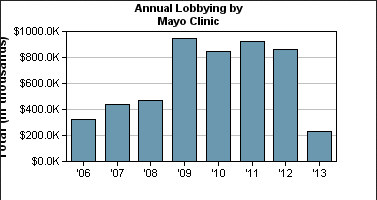Using Legal Definition to Fund Special Interests

The Mayo Clinic was rewarded for lobbying the legislature to define Rochester, MN as a “Destination Medical Center,” giving it special favors
The use of legal definition has become a common strategy for legislatures to fund special interests that contribute to political parties. Most people became aware that legal redefinition was going on at some level when marriage was redefined from its biological definition of a union of male and female, to a social definition of two individuals committed to a partnership. But while the legal redefinition of marriage could be defended on the basis of equal rights, despite its ultimate objective related to financial redistribution to a new class of people, much legislation, like Minnesota’s recent aid and tax omnibus bill (HF677), uses new definitions to create special interest legislation that is opposed to equal treatment under the law:
the bill defines a “medical business entity” as a business that “collectively employs more than 30,000 persons in the state.
Common sense would dictate that a medical business entity would be any entity conducting business in the medical field, whether it be one sole owner, or an enterprise employing thousands of people. But, then the benefits being provided through this legislation would apply to lots of people the lobbyists, and the legislators in their pocket, do not want to fund.
Equal Treatment of All in a New Class
Our legal system, including our courts, has reinterpreted our laws to treat all people in a certain class, as defined by law, equal. For example, voters who mail in absentee ballots might be treated differently from those who cast ballots at polling places. Our laws forbid that certain types of traditional discrimination such as “race,” “gender,” or “religion,” can be singled out for benefits or special protections, but our legislatures blatantly engage in new types of legal discrimination by creating new definitions of classes based on special interest lobbying—discrimination often no less nefarious than traditional forms of discrimination. For example, by defining medical business entities as those with over 30,000 employees for the purposes of providing government financial aid or protection, redefinition can be used to reward favored medical providers and discriminate against others.
There is Often Just One or a Few Members of These New Legal Classes
The above-mentioned tax and aid bill was over 500 pages in length, in part because each tax and aid item was prefaced by a legal definition of the class that would determine who was receiving and who was paying for government programs. The bill was delivered just a few hours before the end of the session in an attempt to avoid scrutiny so that other citizens could not study the special interest give-aways before they became law.
For example, in calculating certain aid to rural Minnesota cities, a qualifying city was defined as having a certain “percentage of homes built before 1940,” a certain unemployment rate, and other conditions. Very frequently only one or a few cities, often in the same district, qualify for this aid that is very targeted and does not treat every city as equal under the law. Often these laws reward city failure in terms of a bailout and penalize successful city management, stimulating an overall decline in responsible city management.
Rewarding Big Business Through Rebates
Another strategy used by the state to favor large businesses is done through establishing a class system of rebates on supposed taxes:
The bill also favored large airlines over small airlines and private jets by levying a jet fuel tax of 15 cents per gallon, but refunding all but 1/2 cent per gallon for purchasers who used over 200,000 gallons of fuel in a year.
This tax undoubtedly favored Delta Airlines and other large carriers in Minnesota while penalizing individuals and small businesses with aircraft. Such discrimination is legally accomplished by defining a class of citizen based on volume of use of jet fuel, rather than equal treatment of all citizens.
For those who want to study how special interest favoritism and government discrimination is so blatantly implemented through the use of definition, I encourage reading Minnesota 2013 Session Laws, Chapter 143.
Some types of discrimination seem to be more acceptable than others to our political elites—depending who has power and the most money for lobbying. That’s never your average citizen, whom the government was ostensibly created to serve.


Comments
Using Legal Definition to Fund Special Interests — No Comments
HTML tags allowed in your comment: <a href="" title=""> <abbr title=""> <acronym title=""> <b> <blockquote cite=""> <cite> <code> <del datetime=""> <em> <i> <q cite=""> <s> <strike> <strong>